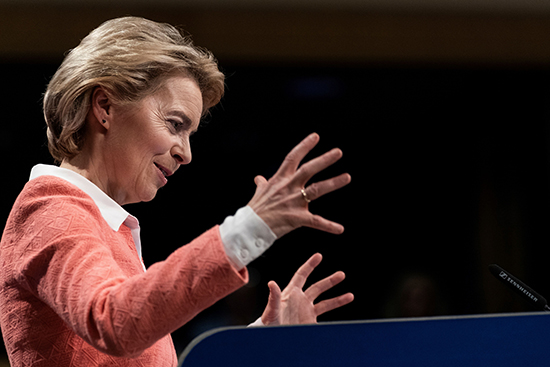夾在貿(mào)易爭(zhēng)端和脫歐夾縫之間,,歐盟調(diào)低2022年前的經(jīng)濟(jì)展望

|
今年11月6日,國(guó)際貨幣基金組織警告稱,,歐洲需要制定“應(yīng)急計(jì)劃”,,避免經(jīng)濟(jì)持續(xù)下滑。接下來(lái),,歐盟委員會(huì)更進(jìn)一步,,自己將歐元區(qū)的增長(zhǎng)目標(biāo)一路下調(diào)至2021年。 歐盟對(duì)2019年的增長(zhǎng)預(yù)期在年初時(shí)還有些樂(lè)觀,。春天,,歐盟經(jīng)濟(jì)持續(xù)增長(zhǎng),盡管“步伐穩(wěn)健”,。到了夏天,,這種增長(zhǎng)“陰云密布”。如今,,在發(fā)布的秋季報(bào)告中,,歐盟警告稱,“在高度不確定性的背景下,,未來(lái)將長(zhǎng)期經(jīng)歷低增長(zhǎng)和低通脹”,,激烈的貿(mào)易爭(zhēng)端、全球經(jīng)濟(jì)放緩和即將到來(lái)的英國(guó)脫歐的共同影響幾乎波及了經(jīng)濟(jì)的方方面面,。 歐盟今年的GDP實(shí)際增長(zhǎng)率為1.1%(低于去年的1.2%),,通貨膨脹率為1.2%。相比之下,,美國(guó)經(jīng)濟(jì)雖然也在放緩,,但預(yù)計(jì)增長(zhǎng)率將為歐盟的兩倍,即2.2%,。 對(duì)歐洲來(lái)說(shuō),未來(lái)兩年的前景差不多會(huì)和今年一樣糟糕,,預(yù)測(cè)2020,、2021兩年的GDP增長(zhǎng)率仍然為1.2%,。通脹在2021年之前不會(huì)再次上升達(dá)到1.3%,仍然遠(yuǎn)低于歐元區(qū)設(shè)定的接近或高于2%的目標(biāo),。 歐元兌美元開(kāi)盤(pán)走高,,但在歐盟公布調(diào)整后的經(jīng)濟(jì)前景展望后,跌至負(fù)值,。具有諷刺意味的是,,即便是疲軟的歐元——報(bào)告預(yù)測(cè)今年歐元將再貶值1%——也無(wú)法幫助這個(gè)以出口為主的區(qū)域擺脫曠日持久的衰退。也就是說(shuō),,來(lái)自建筑,、工業(yè)生產(chǎn)、金融服務(wù),、汽車(chē)和零售行業(yè)的糟糕數(shù)據(jù)共同促使歐盟下調(diào)財(cái)測(cè),。 如果你近幾個(gè)月來(lái)一直關(guān)注歐洲債券市場(chǎng),就會(huì)知道,,當(dāng)像德國(guó)國(guó)債這樣通常十分堅(jiān)挺的投資產(chǎn)品都出現(xiàn)負(fù)值時(shí),,一定出現(xiàn)了很?chē)?yán)重的問(wèn)題。報(bào)告稱:“認(rèn)為經(jīng)濟(jì)前景將繼續(xù)惡化,,預(yù)測(cè)將長(zhǎng)期保持非常寬松的貨幣政策,,加上期限溢價(jià)進(jìn)一步下降,給主權(quán)債券帶來(lái)了壓力,?!?/p> 因此產(chǎn)生了多米諾骨牌效應(yīng)。隨著投資者涌入市場(chǎng)尋求避險(xiǎn)資產(chǎn),,歐洲AAA級(jí)國(guó)家的收益率開(kāi)始跌至負(fù)值,。對(duì)這些債券的需求超過(guò)了供應(yīng),現(xiàn)在“歐洲很大一部分主權(quán)債券的收益率為負(fù)”,。 在其他地方,,負(fù)利率現(xiàn)象降低了購(gòu)房者和企業(yè)的借貸成本,但不足以刺激投資,、刺激消費(fèi),、促進(jìn)增長(zhǎng)。 這也重創(chuàng)了歐的零售銀行業(yè),。對(duì)于歐洲最大的幾家銀行而言,,低利率和平緩的收益率曲線導(dǎo)致它們尤其難以通過(guò)傳統(tǒng)的商業(yè)銀行業(yè)務(wù)——放貸和吸引新客戶——來(lái)提高利潤(rùn)。 西班牙國(guó)家銀行(Banco Santander),、德意志銀行(Deutsche Bank)和匯豐銀行(HSBC)今年均已經(jīng)宣布裁員,,以降低成本并度過(guò)難關(guān)。 歐洲汽車(chē)工業(yè)的表現(xiàn)也好不到哪去。整個(gè)歐盟對(duì)新車(chē)的需求已經(jīng)停滯,,同時(shí)汽車(chē)行業(yè)開(kāi)始大舉投資開(kāi)發(fā)電動(dòng)汽車(chē)和自動(dòng)駕駛汽車(chē),。此外,共享汽車(chē)和打車(chē)軟件的流行遏制了年輕人口中的汽車(chē)擁有量,。在上述因素的共同作用下,,汽車(chē)制造業(yè)的表現(xiàn)遠(yuǎn)低于2015年的水平。 該報(bào)告可能會(huì)引發(fā)一些人呼吁增加財(cái)政支出,、提振GDP,,但迄今為止,德國(guó)及其揮金如土的北歐盟友一直斷然拒絕這樣的建議,。 但歐盟經(jīng)濟(jì)及金融事務(wù)總司長(zhǎng)馬可·布提于11月7日在辯論中表達(dá)了不同的思路,,稱負(fù)利率和低利率實(shí)際上為歐元區(qū)提供了一個(gè)通過(guò)支出擺脫衰退的特有機(jī)會(huì)?!胺浅5蜕踔霖?fù)的融資成本為推出具有高社會(huì),、高環(huán)境、高經(jīng)濟(jì)回報(bào)的項(xiàng)目提供了機(jī)會(huì),?!辈继嵴f(shuō),“現(xiàn)在應(yīng)該抓住這個(gè)機(jī)會(huì),?!?/p> 該你出招了,德國(guó),。(財(cái)富中文網(wǎng)) 譯者:Agatha |
On November 6, the International Monetary Fund warned that Europe needed “contingency plans” to avoid a protracted decline. Today, the European Commission itself went one step further, cutting its eurozone growth target all the way through 2021. The EU’s 2019 growth outlook started the year with some optimism. In the spring, it saw continuing growth, though at a “moderate pace.” By the summer, that growth was “clouded.” Now, in the published autumn report, it’s warned of “a protracted period of subdued growth and low inflation in the context of high uncertainty,” as bruising trade wars, a slowing global economy and a looming Brexit have combined to hit nearly every sector of the economy. The EU now sees real GDP growth of 1.1 percent (down from 1.2 percent) and inflation of 1.2 percent this year. In contrast, the U.S. economy, while also slowing, is expected to grow at twice that rate, at 2.2 percent. For Europe, the outlook stays nearly as bad over the next two years with forecasted GDP growth running at 1.2 percent in both 2020 and 2021. Inflation won’t nudge up again until 2021, reaching 1.3 percent, still far below the bloc’s target of closer to 2 percent or higher. The euro, which started the day trading higher against the dollar, fell into negative territory following release of the bloc’s revised outlook. The irony is that not even a weak euro—the report forecasts an additional 1% decline in the value of the common currency this year— can help lift the export-heavy bloc out of its protracted slump. To wit, poor data from construction, industrial production, financial services, automotive and retail sectors all contributed to the decision to lower the outlook. If you were paying attention to Europe’s bond market in recent months you’d have known something was deeply amiss when usually rock-solid investments like German bunds went negative. “The perception of a deteriorating outlook, expectations of a prolonged period of very accommodative monetary policy, and a further decline in the term premium put pressure on sovereign yields,” the report said. That created a domino effect. Europe’s AAA-rated nations started seeing yields fall into negative territory as investors piled into the market seeking safe-haven assets. The demand for these bonds exceeded the supply, and now “a substantial part of sovereign bonds in Europe is trading at negative yields.” Elsewhere, the negative rates phenomenon has sent borrowing costs down for homebuyers and businesses, as well, but not enough to spur investment, consumer spending and boost growth. It’s also clobbering Europe’s retail banking sector. For Europe’s biggest lenders, low interest rates and flattening yield curves are making it exceedingly difficult to grow the bottom line through the traditional commercial banking operations of lending and attracting new accounts. Banco Santander, Deutsche Bank and HSBC have all announced job cuts this year to reduce costs and weather the storm. Europe’s automotive industry hasn’t fared much better. Demand for new cars has stalled across the bloc just as the industry begins a heavy investment into developing electric and more autonomous driving vehicles. Also, the proliferation of car-sharing and ride-hailing apps is depressing car ownership among the younger demographics. Add it up, and car manufacturing is well below 2015 levels. The report is likely to trigger calls for greater fiscal spending to boost GDP growth, a suggestion that so far Germany and its spendthrift northern European allies have rebuffed at every turn. Marco Buti, Director General of Economic and Financial Affairs, took a different tack in the argument on November 7, saying negative and low interest rates actually provides a unique opportunity for the bloc to spend its way out of a downturn. “Very low or negative financing costs provide an opportunity to bring forward projects with a high social, environmental and economic return.” Buti said. “This window of opportunity should be used now.” Your move, Germany. |













